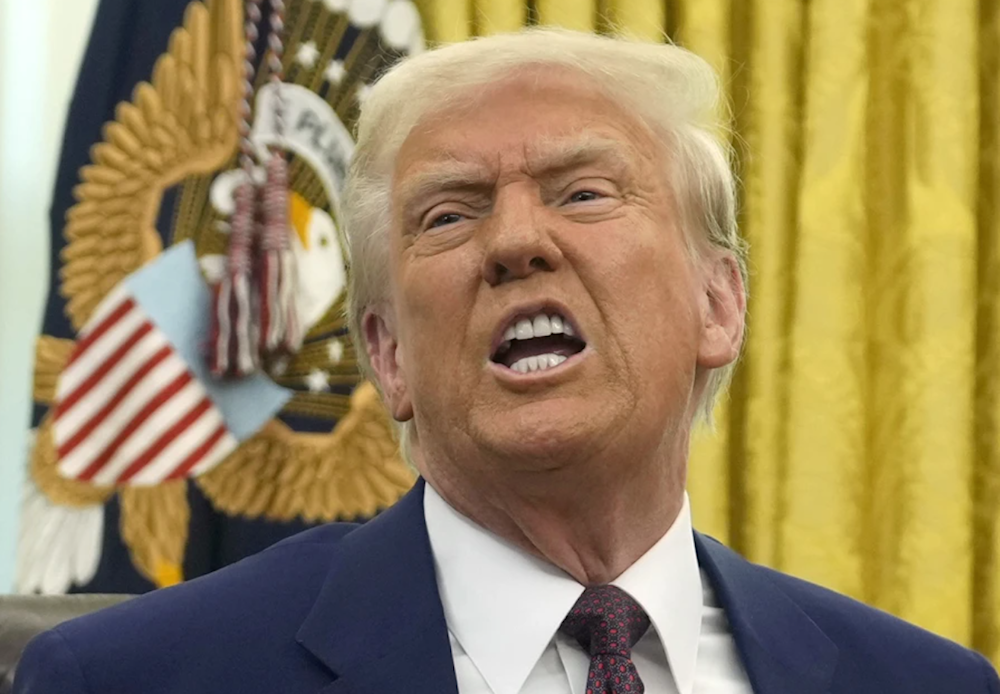Trump demands 'radical' Reuters return $9mln to US government
Donald Trump and Elon Musk seemed to have distorted the Pentagon's cybersecurity contract with Reuters, sparking controversy and conspiracy theories.
-

President Donald Trump speaks to reporters after signing an executive order in the Oval Office of the White House, on February 13, 2025. (AP)
US President Donald Trump slammed what he called "radical left" Reuters for a 2018 Pentagon deal to "study large-scale social deception"—a contract issued under his administration—and ordered that the news agency return the money immediately.
The president's rant came early Thursday, citing the disclosure as a conclusion of his newly formed Department of Government Efficiency (DOGE). Trump shared on Truth Social: "Looks like Radical Left Reuters was paid $9,000,000 by the Department of Defense to study 'large-scale social deception.' GIVE THE MONEY BACK NOW!"
DOGE's agency chief, Elon Musk, shared a post on X saying the contract revealed the "news agency received millions for social engineering."
Reuters was paid millions of dollars by the US government for “large scale social deception”.
— Elon Musk (@elonmusk) February 13, 2025
That is literally what it says on the purchase order! They’re a total scam.
Just wow. https://t.co/GGxoVQSwN8
Musk's controversial claim is that Reuters, a global news organization, was waging disinformation efforts on behalf of the Pentagon.
The deal, originally spotted by MAGA influencer Ian Miles Cheong, arose after Musk, apparently dissatisfied with a Reuters piece claiming DOGE cuts were politically driven, requested followers to "find out" how much federal funding the group had gotten.
what do you think about this piece? https://t.co/0R4FeOkHmR
— Ron Howard (@RealRonHoward) February 13, 2025
This sparked a new wave of conspiracy theories, which found their way back to the Oval Office.
A short fact-check, however, reveals that the contract in question was given in 2018 during the first Trump administration and awarded to Thomson Reuters Special Services for cybersecurity research.
The contract, awarded by the Department of Defense through the Air Force Research Laboratory and DARPA, is characterized on the government's USA Spending website as being related to "Active Social Engineering Defense (ASED), Large Scale Social Deception (LSD)."
The ASED initiative intends to develop scalable systems capable of detecting, assessing, and mitigating threats in order to improve cybersecurity.
While Musk claimed that Reuters was paid to carry out "large-scale social deception," Trump, with a softer tone, stated that the deal was to "study" it.
The president did not mention that the contract was granted to Thomson Reuters Special Services, which works independently of Reuters News and specializes in fraud detection and risk management—areas that are directly important to combatting cyber threats.
LexisNexis, Bloomberg, and Wolters Kluwer operate in comparable markets, providing fraud protection and compliance technologies.
TRSS responds
Steve Rubley, the CEO of Thomson Reuters Special Services, told Mediaite in a statement that Thomson Reuters Special Services (TRSS), LLC is a "separate U.S. legal entity governed by an independent Board of Directors, that operates independently from Reuters News."
Rubley emphasized that the two entities have been conflated recently and noted that the debate has misrepresented the nature of TRSS' relationship with the Department of Defense.
"TRSS has provided software and information services to U.S. government agencies across successive administrations for decades, to assist in identifying and preventing fraud, supporting public safety, and advancing justice," his statement detailed.
In addition, he asserted that Reuters is the leading provider of news globally, and commercial agreements have no bearing or influence on its editorial coverage.

 3 Min Read
3 Min Read










